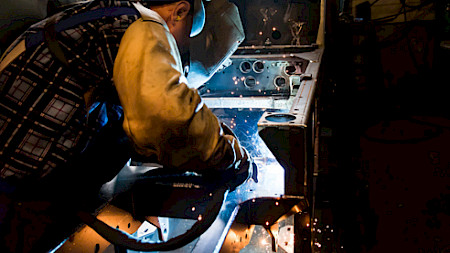12.02.2026, 09:35 Uhr
Der britische Vermögensverwalter Schroders wird für 9,9 Milliarden Pfund (entspricht laut Reuters 13,5 Milliarden US-Dollar) vom US-amerikanischen Asset-Manager Nuveen übernommen.


Owen Scarrott, Global Sector Specialist at Schroders, believes that President Trumps import tariffs are more about galvanising political support than galvanised steel.
At the start of March, the Trump administration announced that protectionist measures to be completed under national security directives would include a blanket 25% duty on steel imports and 10% on aluminium imports.
Almost immediately, speculation began to build around the potential for retaliatory measures with newspaper headlines warning of the possibility of "trade wars". Owen Scarrot, Global Sector Specialist, Multi Regional Equity at Schroders thinks that this is somewhat overdone. As he discusses below, steel tariffs are, according to him, unlikely to have dramatic economic consequences, either for the US steel industry or for steel suppliers to the US. The decision seems to be driven in his view more by the potential for domestic political gains. It also signals that the administration is willing to play "hardball" to reduce the broader US trade deficit
Heavy metal versus status quo
The steel industry has been a source of protectionism for many years. "Tariffs are not new to this sector, and many countries have some form of protectionism for their steel industries," states Scarrott.
Previously, even where protectionist measures were in place, steel would "slip through the net". Methods such as "transhipping" have been employed to evade the impacts of duties, by transferring goods from one jurisdiction to another during the journey. This means, says Scarrott, that the product appears to have come from a trade-friendly nation and therefore avoids duties. The difference this time is how vocal the Trump administration has been on the topic, and how broad the application of tariffs is planned to be. "This is quite a contrast. Normally protectionism is very specific focusing on individual products and largely kept quiet," says the expert.
Scarrott therefore raises the question, whether tariffs will tariffs see a major revival of the US steel industry. "Probably not but some marginal capacity may be added back," is his answer. The US is still a net steel importer and remains short of steel production capacity. Imports from major partners, Canada especially, are a critical part of supply chains, to the extent that some exemptions for preferred nations are all but assured. This means that the hype surrounding a rebirth of the US steel industry may be quite far wide of the mark.
The bigger question the broader trade deficit
This begs the question of whether this is a China issue, given that President Trump has previously accused China of "dumping" products (exporting goods at prices deemed uneconomic for the producer). Except, China is no longer a major exporter of steel to the US that story is out of date.
"However, one could view steel and the decline of the US 'rust belt' as being symbolic of the longer-term US trade deficit with China," says Scarrott. That is a major focus for Trump, whose administration has reportedly asked the Chinese authorities to provide a plan to reduce the bilateral trade deficit by 100 billion US-Dollar. According to the expert, galvanizing support from the rust belt could be politically valuable for Trump; reducing a trade deficit through the threat of trade wars even more so.
It seems unlikely that the end game is just to increase domestic steel production. Scarrott believes that the tariffs are more likely the feature of a strategy to bargain for preferential trade. This should prove popular in key voting states.